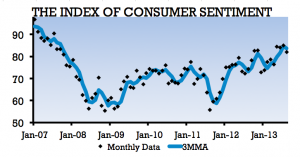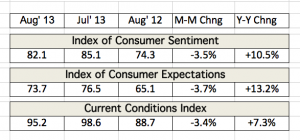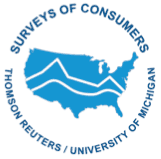
Consumer confidence eases in August, reflecting economic cross-currents
August 30, 2013
ANN ARBOR—Consumer confidence eased in August after reaching its highest level in six years in the prior month, according to University of Michigan economist Richard Curtin, director of the Thomson Reuters/University of Michigan Surveys of Consumers. Conducted by the U-M Institute for Social Research (ISR) since 1946, the Surveys monitor consumer attitudes and expectations.

Click image for larger view.
“The August survey indicates that the recent confidence gains have stalled as consumers await decisions on the federal budget and monetary policy,” said Curtin. “Unlike a year ago, consumers do not anticipate that the budgetary issues will engender a similar Congressional stalemate, but few express a great deal of confidence in the economic policies of the government. A renewed Congressional storm as well as rising market interest rates could trim the anticipated gains in consumer spending and weaken the pace of overall economic growth. Without this unneeded harm, consumer confidence will regain its footing and act to expand spending in the year ahead.”

Click image for larger view.
The small retrenchment still meant that the Sentiment Index was significantly higher than a year ago and still points toward increases in consumer spending during the year ahead, according to Curtin. The cross-currents responsible for the small August decline are inevitable in a slow growth economy. Consumers were more optimistic about income increases during the year ahead than any other time in nearly five years, although they have become less certain about whether the economy would be strong enough to appreciably lower the unemployment rate in the year ahead. Perhaps the largest August change was that nearly two-thirds now expect interest rate increases during the year ahead.
View and download the chart and table (Excel files).
Personal Finances Improve
While complaints about current incomes increased in August, consumers anticipated the largest income increases since November 2008. Unfortunately, the median expected increase was just 0.9%, smaller than the inflation rate anticipated for the year ahead. While consumers still anticipate an expanding economy, the majority are not ready to expect the re-establishment of “good” economic times. This is largely due to concerns about unemployment; as many consumers expected increases as declines in the jobless rate during the year ahead.
Favorable Buying Plans
Buying plans for durables and vehicles declined slightly in August largely due to less favorable views of market prices. Unfavorable views of vehicle-buying conditions rose to 31% in August from 25% in July, although more than half of all consumers still mentioned attractively low prices or interest rates on vehicle purchases. While home buying attitudes declined, home selling conditions improved: prices were judged less favorably for buying (the worst since 2007), and more favorably for selling (the best since 2006).
Consumer Sentiment Index
The Sentiment Index was 82.1 in the August 2013 survey, down from 85.1 in July but above last August’s 74.3. The Expectations Index fell to 73.7 in August, down from 76.5 in July, remaining well above last August’s 65.1. The Current Conditions Index was 95.2 in August, down from 98.6 in July, but well above last August’s 88.7.
About the Survey

Richard Curtin (Photo by D.C. Goings)
 The Survey of Consumers is a rotating panel survey based on a nationally representative sample that gives each household in the coterminous U.S. an equal probability of being selected. Interviews are conducted throughout the month by telephone. The minimum monthly change required for significance at the 95% level in the Sentiment Index is 4.8 points; for Current and Expectations Index the minimum is 6.0 points. For more information, visit the Surveys of Consumers website at http://new.sca.isr.umich.edu.
The Survey of Consumers is a rotating panel survey based on a nationally representative sample that gives each household in the coterminous U.S. an equal probability of being selected. Interviews are conducted throughout the month by telephone. The minimum monthly change required for significance at the 95% level in the Sentiment Index is 4.8 points; for Current and Expectations Index the minimum is 6.0 points. For more information, visit the Surveys of Consumers website at http://new.sca.isr.umich.edu.
Watch a video about the survey:
Contact:
[email protected] or
Surveys of Consumers, (734) 763-5224 or
Thomson Reuters PR Hotline, (646) 223-7222, ext.1
